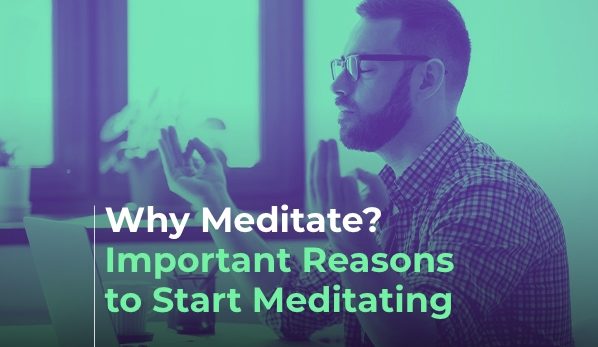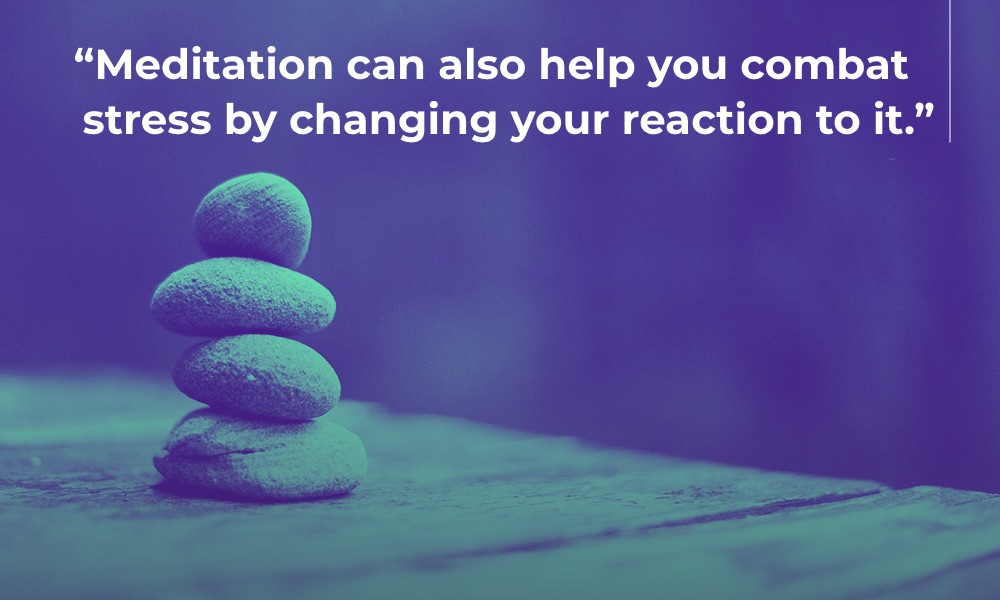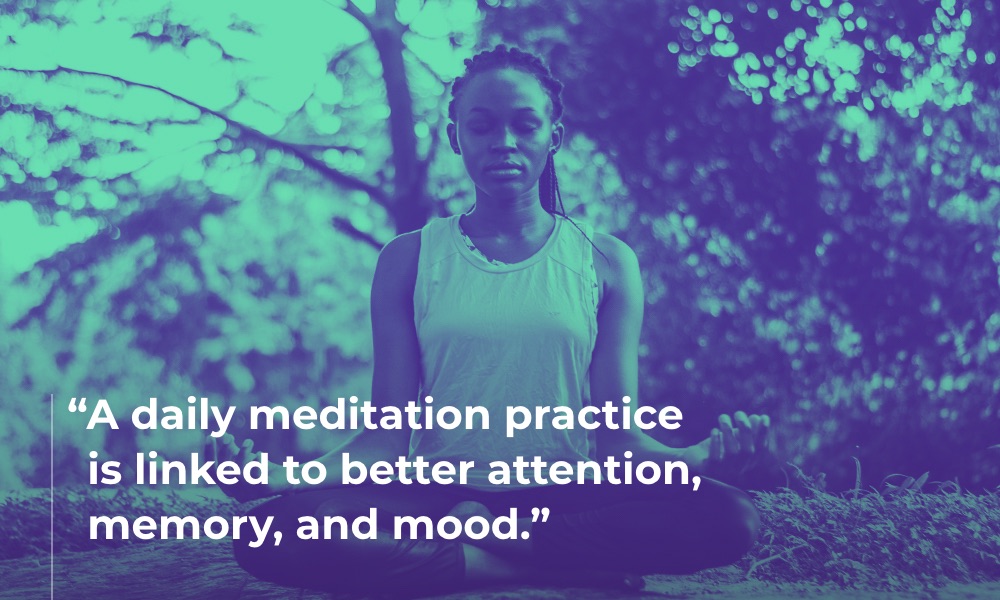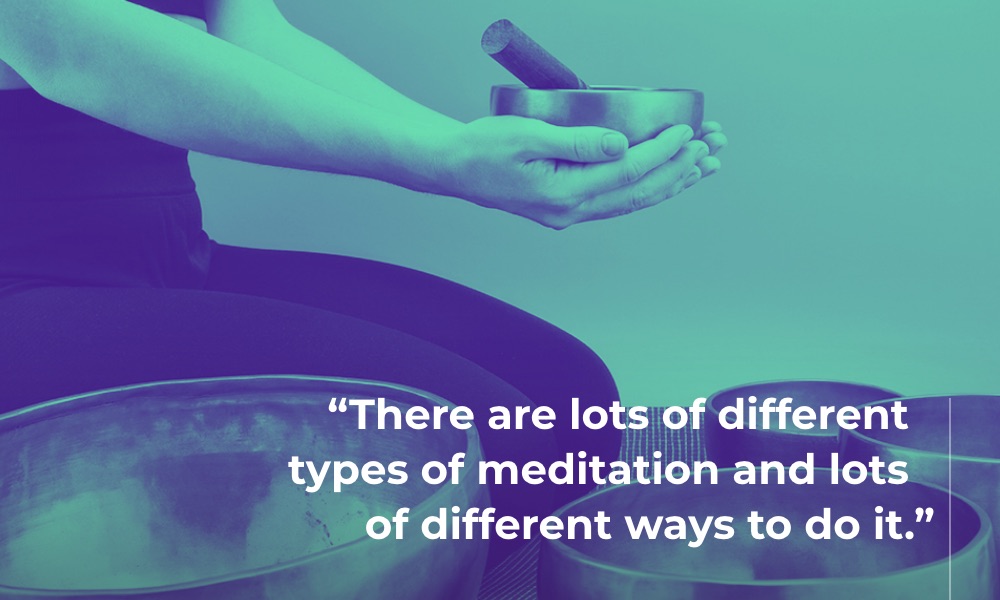Why start meditating? Because of its many benefits! The benefits of meditation are nearly endless. Not only can it cultivate inner peace, but it can also improve happiness, increase your productivity, focus, and help you become the best version of yourself.
It can improve various physical ailments—from IBS to arthritis—and even reduce your perception of pain. Additionally, and maybe most importantly, meditation helps you develop more positive emotions, allowing you to gracefully deal with the stress of daily life. (And enjoy the good parts of life more.)
Regular meditators know that meditation is the ultimate form of self-care.
If you’re looking for reasons why you should start meditating, you’re in the right place. In this article, we explore the many reasons why meditation is important. We also discuss how meditation can help you cope with stress and all of the beneficial things meditation can do for your body and mind. Finally, we’ll reveal the easiest way to get started meditating right now.
Why is Meditation Important?
Meditation is important because of its countless benefits. But, just like with any other wellness practice, the way that it benefits you will be unique to your situation. Though we can’t predict exactly why meditation will be important to you, we can say that it’s generally important because it improves overall well-being.
Meditation can help improve and amplify your positive emotions. A regular meditation practice can help you be more creative, increase your energy, enhance your focus, and even improve your relationships. You can use meditation to help increase your productivity or just to help you relax.
Plus, the practice of meditation can improve how you go about your day. Meditation helps center you in the present moment, encouraging mindfulness and presence in your everyday interactions.
Meditation may also be important to help mitigate some of the challenging aspects of your life. For example, if you have a demanding job, busy family life, or hectic social schedule, meditation may help reduce your stress.
And if you’re one of the 1 in 5 U.S. adults with a mental illness (like anxiety or depression), you’ll likely enjoy reduced symptoms with a daily meditation practice. Plus, if you have a chronic illness and/or chronic pain, meditation can help you cope.
Before we start our deep dive, here are the top 19 reasons to start meditating:
- Stress reduction
- Better sleep
- Less pain
- Healthy blood pressure
- Reduced IBS symptoms
- Decreased fibromyalgia symptoms
- Healthy weight loss
- Reduction in migraines
- Fewer arthritis symptoms
- Reduction in binge eating and emotional eating
- Fewer negative thoughts
- Improves memory
- Reduces symptoms of depression
- Fewer feelings of aggression
- Helps combat addiction
- Fewer symptoms of anxiety
- Fewer symptoms of PTSD
- Improves ability to process emotions
- Improves ability to focus
Meditation and Stress Reduction
Stress reduction is one of the most popular reasons people start meditating. More and more people are catching on to the fact that meditation is one of the best ways to deal with the stresses of modern daily life. Even doctors are prescribing it with more frequency than they ever have before!
Though your natural reaction to stress may be trying to fight it or succumbing to it, meditation offers a better alternative. It teaches you how to accept your stressful feelings so that they can “move through you” without affecting you as much as they normally would.
Meditation can also help you combat stress by changing your reaction to it. Becoming a regular meditator means you’re less likely to respond with “negative thoughts or unhelpful emotional reactions” when a stressful situation comes along. This is critical since it’s not actually negative emotions that wreak havoc on our mental and physical health—it’s how we react to them.
Similarly, meditation also helps by increasing your self-awareness. With this increase in self-awareness, you become more aware of how you’re reacting to stressors, and you can make better choices that lead to less stress in the future.
One more amazing thing about meditation for stress: less stress improves your immune system. When your body encounters a stressful situation, it releases cortisol, the stress hormone. Cortisol reduces the inflammation that occurs when the immune system encounters stress.
But when chronic stress keeps cortisol levels high, it suppresses your immune system and makes you more susceptible to disease. The good news is that mindfulness meditation reduces cortisol in the body, which improves the immune system.
Physical Health Benefits of Meditation
If you’re looking for more reasons to start meditating, simply look down at your own body! There are plenty of physical health benefits of meditation, including (but certainly not limited to):
- Better sleep. Anyone who’s had insomnia can attest that when your sleep is bad, the rest of your life tends to follow suit. Happily, meditation is proven to help you sleep better.
- Less pain. If you have acute or chronic pain, sitting still and focusing on your body and breath may feel counterintuitive. But it’s actually one of the best ways to reduce your perception of pain.
- Healthy blood pressure. If left untreated, high blood pressure can lead to a range of scary health issues, like a heart attack or stroke. Always speak with your healthcare professional about the best options for managing your blood pressure, but know that meditation is scientifically proven to help reduce it. Plus, a specific form of meditation called Transcendental Meditation has been shown to reduce oxygen consumption, heart rate, and skin resistance among meditators while meditating. Additionally, certain practitioners of yoga and meditation have proven that they can voluntarily control their heart rate and pulse.
- Reduced IBS symptoms. Anyone enduring the symptoms of irritable bowel syndrome knows that it can take a toll on nearly every aspect of your life. So it’s encouraging to know that meditation can provide some relief to IBS symptoms.
- Decreased fibromyalgia symptoms. If you’re struggling with the pain and stiffness of fibromyalgia, it may be time to start sitting with your breath. Mindfulness meditation shows promise as a treatment option.
- Healthy weight loss. The weight loss journey is as mental as it is physical. If you’re looking to lose a few pounds for your health, meditation can help you get in the right headspace.
- Reduction in migraines. If you suffer from frequent migraines, you know how debilitating they can be. So you may want to add meditation to your migraine management routine. One study shows that meditation decreases the intensity and unpleasantness of migraines, and it works better than headache education. The study also found that meditation improves the quality of life and depression symptoms of migraine sufferers.
- Fewer arthritis symptoms. About 27 million American adults have osteoarthritis. Thankfully, meditation can help manage it. Studies show that a regular mantra meditation program can reduce osteoarthritis pain and improve mood.
- Reduction in binge eating and emotional eating. Whether you’re aiming to lose weight or simply let go of a habit that can damage your self-esteem and peace of mind, meditation is an excellent way to cope with binge eating and reduce its frequency. A systematic review of 14 studies found that regular meditation successfully reduces this behavior.
The Mind and Meditation
If you’re interested in improving your mind through meditation, there are plenty of reasons to do that, too:
- Fewer negative thoughts. As the Dalai Lama said, “A disciplined mind leads to happiness, and an undisciplined mind leads to suffering.” This is especially true when it comes to controlling those unruly negative thoughts—which, in excess, can lead to mental health issues like anxiety and depression. Meditation is proven to reduce the number of negative thoughts you have over time.
- Improves memory. A daily meditation practice is linked to better attention, memory, and mood. So if you can’t remember where you put your car keys, you may want to start meditating regularly. And the good news is, you can meditate without leaving the house!
- Reduces symptoms of depression. Depression is complex and can vary greatly from person to person. However, meditation is scientifically proven to improve depression symptoms across a range of different depression types.
- Fewer feelings of aggression. If you struggle with feelings of aggression, you’re not alone. Thankfully, meditation can help reduce aggressive feelings, and it can help increase feelings of relaxation and well-being.
- Helps combat addiction. Addiction isn’t limited to drugs, alcohol, and gambling. Many folks struggle with addictions to shopping, food or other vices that (when left unchecked) can take control of their lives. Thankfully, meditation is showing promise as a front-line treatment for addictions.
- Fewer symptoms of anxiety. Anxiety affects about 40 million Americans every year, making it the most common mental illness in the United States. If you’re one of these people, know that there is hope—and meditation is a great way to reach for it! Meditation for anxiety is extremely effective. Moreover, research suggests it’s more effective the more anxiety you have.
- Fewer symptoms of PTSD. If you have post-traumatic stress disorder, it’s time to tune into mindfulness. Studies show that practices like yoga and meditation can lead to reduced symptoms of PTSD.
- Improves ability to process emotions. When you’re better able to process your emotions, you’re likely to see an all-around improvement in your mental health. And studies show that even brief mindfulness meditation can help you process your feelings.
- Improves ability to focus. With all of the distractions we’re presented with every day (from constant emails to the demands of family life), it can be very hard to keep our attention on the present moment. Thankfully, meditation really excels in this area. Studies show that meditation improves your ability to pay attention, even if you’re new to practicing it, and even if the meditation session is brief.
Getting Started with Primed Mind Meditation Primers
It’s no secret that meditation has tons of benefits. But when you’re first starting out, it can be difficult to decide how to meditate. But there’s no real right or wrong way to start meditating. You can add a morning meditation to your daily routine, or you can meditate before you go to sleep.
You can meditate sitting in a chair, or you can meditate lying down. There are lots of different types of meditation and lots of different ways to do it. But no matter what you choose, you’re sure to start seeing some improvement in your daily life.
Are you ready to get started with meditation right now? We don’t blame you. To start off on the right foot, we recommend using a guided meditation app. Guided meditations help to gently lead you through your mindfulness training, so your mind doesn’t wander too far from your breath. And because apps offer a variety of meditation practices, you stay excited to return to your practice each day.
Primed Mind is a meditation app designed by one of the world’s leading mindset coaches. It helps you access the power of hypnotic meditation from the comfort of your home. Primed Mind is free to download, and you get the benefits of going to an in-person meditation program without the commute. Plus, new meditations are added every month, so you never run out of inspiration.
At Primed Mind, we have a variety of meditations tailored to whatever area of your life you want to improve. Whether it’s getting better sleep, improving your sports performance, reducing your social anxiety, or being more present, Primed Mind can help you. Download Primed Mind for free and start meditating today!




